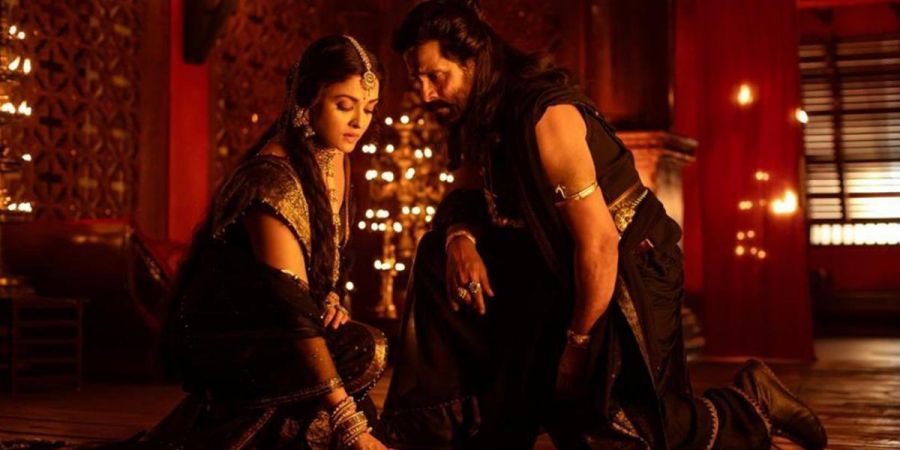

Synopsis of the film Ponniyin Selvan: Part 2: There is a plan in motion to assassinate the monarch and the two Chola dynasty princes on the same day. Can the Pandiya rebels, who are being led by the vengeful Nandhini, withstand the wrath of the Cholas?
MOVIE REVIEW
It's not the finest time to appreciate "Ponniyin Selvan: Part II," the second installment of the much awaited Tamil translation of the acclaimed multi-volume historical drama by Kalki Krishnamurthy. The indeterminate future is probably the time for this sequel, when S.S. Rajamouli's influence on modern Indian pop cinema may not seem as significant and when Indian film fans may be able to (possibly) see the many "Baahubali" imitators with more clarity.
A few Indian filmmakers, including writer/director Mani Ratnam, who is best known to American moviegoers for directing the seminal 1998 Bollywood romance drama "Dil Se," have expressed interest in adapting "Ponniyin Selvan." Ratnam has also acknowledged that "Baahubali's" inspiration and commercial success were essential to the creation of his two-part adaptation of "Ponniyin Selvan." Based on "Ponniyin Selvan: Part II," a sequel that, like Rajamouli's "Baahubali: The Conclusion," frequently feels like an involved but rewarding de-escalation of the emotional intensity from the first film, it's simple to understand why. Unless you've read Krishnamurthy's books, you can't appreciate "Ponniyin Selvan: Part II" unless you've seen "Ponniyin Selvan: Part I."
Some good news, but it's also bad: it's likely that many viewers have already read Kalki's well-known epic, which was initially published in serial form throughout the early 1950s in "Kalki" magazine. Anyone who hasn't read the book, but still wants to see "Ponniyin Selvan: Part II" on a big screen should know that "Part I" was more about the itinerant Vanar prince Vallavaraiyan Vandiyadevan (Karthi) than the beloved title character (Jayan Ravi)—a nickname for the 10th century Chola dynasty Prince Arunmozhi—or his hothead older brother Aditha (Vikram).
The primary characters of "Ponniyin Selvan: Part 1," such as the princes' disturbed and alleged wicked stepmother Nandini (Aishwarya Rai Bachchan) and their treacherous opponent Madhuranthakan (Rahman), occupy more prominent positions in "Ponniyin Selvan: Part II," as do Arunmozhi and Aditha. Everyone suspects Nandini of plotting to assassinate Aditha, who also has suspicions about Nandini and a romantic tension with her, as well as her husband.
In "Ponniyin Selvan: Part II," there is more Nandini and a lot more auxiliary figures who either support or oppose her, such as the Chola chieftains who covertly support Madhuranthakan or the numerous advisors to the Chola princes, such as their sister Kundavai (Trisha Krishnan) and, oh yeah, Vallavaraiyan Vandiyadevan. Without a formal invitation, Vallavaraiyan, an itinerant fabulist, zips around "Ponniyin Selvan: Part I"; he bargains facetime with powerful individuals utilising trinket gifts like a sword, a signet ring, and handwritten notes successfully connects the multiple plotlines in Krishnamurthy's long story.
In "Part I," Vallavairyan exemplifies the Byzantine, loosely connected storytelling traditions that unmistakably served as Ratnam and his two Tamil-speaking co-writers' sources of inspiration. As an overstuffed sequel to a protracted adaptation, "Ponniyin Selvan: Part 2" may be elevated by Ratnam's signature visual acuity, his co-writers' meticulous attention to detail, and the performances of his mega-watt ensemble cast. Particularly Nandini, it appears that she is a more emotionally nuanced character in "Ponniyin Selvan: Part II" than she was in the first film. Aditha and Arunmozhi also smoulder more frequently, but only Vikram gets to flaunt his equally angsty lines, such as, "Happiness and peace elude those who hate themselves."
"Ponniyin Selvan: Part I" maintains all of the low-key workmanship that was put into the otherwise high-toned "Ponniyin Selvan: Part I.""Baahubali: Part II," which was simultaneously filmed with the previous installment over 150 days in 2019–2021, was divided into two parts. Ratnam makes the most of those sequences even though his characters spend less time sighing romantically and falling in love than other authors. Since being led around by the nose is a big part of the fun in both 'Ponniyin Selvan' films, I won't ruin your enjoyment by revealing who longs to see whom. This makes it more challenging to evaluate "Ponniyin Selvan: Part II" at this time since, like "Ponniyin Selvan: Part I," it will probably get better with time.
There's virtually nothing in this sequel that the creators of the numerous other recent "Baahubali"-inspired mytho-historical epics couldn't have also accomplished, thus there isn't really anything that "Ponniyin Selvan: Part II" stands out as "A Mani Ratnam Film," as it claims in the opening credits. However, it's reassuring to see that "Ponniyin Selvan: Part II" looks and moves as well as it does, even though one suspects that it will also hold up when it eventually appears on streaming services like Prime Video, where you can still catch up with "Ponniyin Selvan: Part I." While Kalki's world may not appear as grand as it seemed, either in the filmmakers' heads or in reality, Ratnam and his collaborators successfully land their massive pot-boiler.It is large enough to get lost in on the page.
